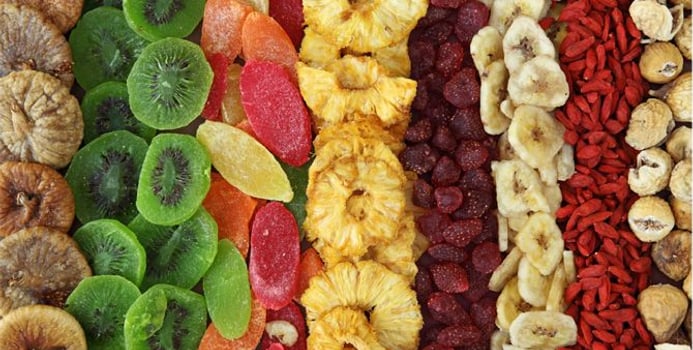Dried fruits are very popular for a multitude of reasons! Eating fruit is associated with improved health and provides many of the essential minerals, vitamins, phytonutrients and fiber that you need every day. Dried fruit doesn't spoil as quickly and is an easy snack to pack, especially for activities like hiking!
But keep in mind, dried fruits are higher in calories because they are more concentrated once the water has been removed. Weight for weight, fresh fruit will have few calories than its dehydrated version. One hundred grams of fresh plums contain only 46 calories, whereas 100 grams of prunes (dried plums) have 240 calories. It is also important to note that some vitamins are lost during the drying process. For the same fresh plums, you are eating 16% of your daily needs for vitamin C, but when dried, you are getting only 1%.
It is also important to note that a single serving of fresh fruit is 1 cup, but when fruit has been dehydrated, a single serving is only one half of a cup.
When you are selecting different dried fruits, be sure to read the packaging label. Look not only at the appropriate portion size, but also what else has been added to the dried fruit. Often dried fruits have additional sugar added to enhance the flavor and draw the water from the microbial cells, thereby protecting it from spoilage. Look for labels that say "no sugar added," or the dried fruit might be a treat rather than a healthy snack. Some dried fruits will be hard to find without added sugar, especially cranberries, pineapple, and bananas. Another commonly added ingredient is sulfur dioxide, which works to preserve the fruit and prevent discoloration.
Some popular and nutritious dried fruits include the following:
1. Peaches
½ cup serving: 191 calories, 6.5 grams of fiber
Peaches may not be as common as other dried fruits like apricots but are also a nutritioius choice. They contain 34% of your daily vitamin A needs and 18% of iron recommendations, as well as being a good source of potassium, niacin and copper.
2. Apples
½ cup serving: 104 calories, 3.5 grams of fiber
Although maybe not as nutrition-packed as some other dried fruits, a serving is often lower in calories than many other choices if you are looking for a lighter snack.
3. Lychees
½ cup serving: 221 calories, 4 grams of fiber
These delicious fruits are often sold frozen or canned, but if you can find them dried they can be a great addition to your diet. One serving provides an amazing 244% of your daily needs for vitamin C! Additionally it has 3.2 grams of protein and good source of riboflavin.
4. Apricot
½ cup serving: 156 calories, 4.5 grams of fiber
Apricots have 47% of your daily vitamin A needs in a single serving and are a good source of potassium, vitamin E and copper!
5. Prunes
½ cup serving: 223 calories, 0 grams of fiber
Although lacking in insoluble fiber, prunes are often linked to providing a laxative effect. Additionally, in a single serving there is 2.5 grams of protein and 13% of your daily iron requirements.
6. Figs
½ cup serving: 185 calories, 7.5 grams of fiber
Figs are also associated with a laxative effect. Additionally, they are a good source of important minerals like calcium, magnesium, potassium and manganese.
7. Cranberries, sweetened
½ cup serving: 185 calories, 3 grams of fiber
It is almost impossible to find unsweetened dried cranberries, but in appropriate servings they can still be a healthy choice! The dark color of foods, including cranberries, is associated with being rich in phytonutrients!
8.Currants
½ cup serving: 204 calories, 5 grams of fiber
Currants have 3 grams of protein per serving, 13% of daily iron and 18% of the average person's daily needs for potassium.
9. Raisins
½ cup serving: 217 calories, 2.5 grams of fiber
Although often sold in miniature box servings to be packed in lunches, raisins are also good to have around the house to cook with and like other dried fruits are fun to add to porridge. One serving has 2 grams of protein and is a good source of many minerals like potassium and manganese!
10. Pears
½ cup serving: 236 calories, 7 grams of fiber
Dried pears are still a good source of vitamin C, iron, vitamin K and copper. Try adding as a salad topper!
11. Tomatoes
½ cup serving: 69 calories, 3.5 grams of fiber
Often added as a topping to pizzas, salads and other savory recipes, dried tomatoes are a nutritious choice. One serving is a good way to add iron, vitamin C, niacin, potassium, magnesium and manganese to your meal!
12. Jujube
½ cup serving: 229 calories, 0 grams of fiber
Although a more uncommon fruit, jujubes can be a fun new food to try. They are still a good source of vitamin C and riboflavin!
Emily DeLacey MS, RD is a Registered Dietitian and currently working in Jamaica as a HIV/ AIDS Prevention Specialist. She attended Central Washington University for her Bachelor's Degree in Science and Dietetics and continued on after her internship to Kent State University for her Master's Degree in Science and Nutrition, with a focus on public health and advocacy. She served as a U.S. Peace Corps Volunteer in Malawi 2012-2014 working as a Community Health Advisor in a rural village, immersing in the joys of life without electricity or running water. She has been to 20+ countries and 47 of the 50 states in the US. Traveling, adventuring and experiencing new cultures has made her a passionate advocate for the equality of nutrition and wellness for all people.




